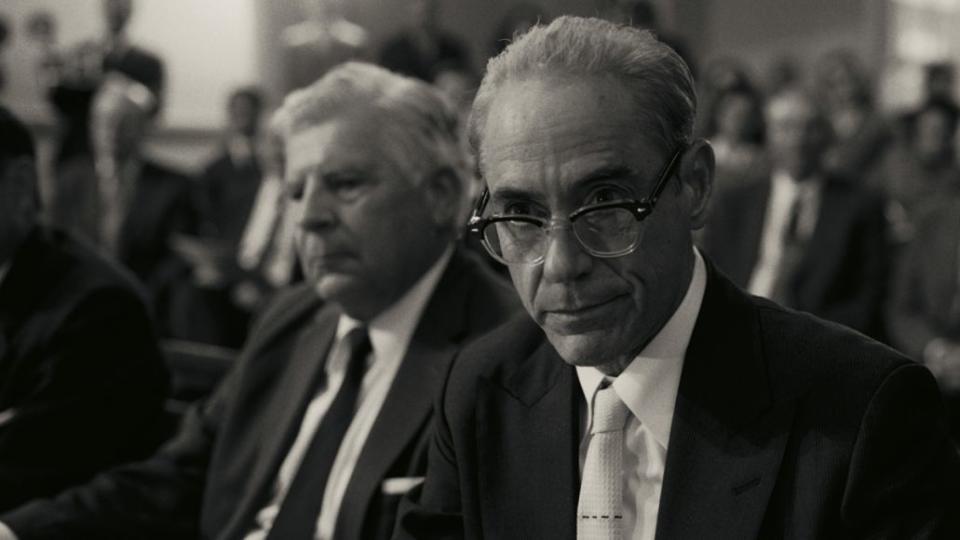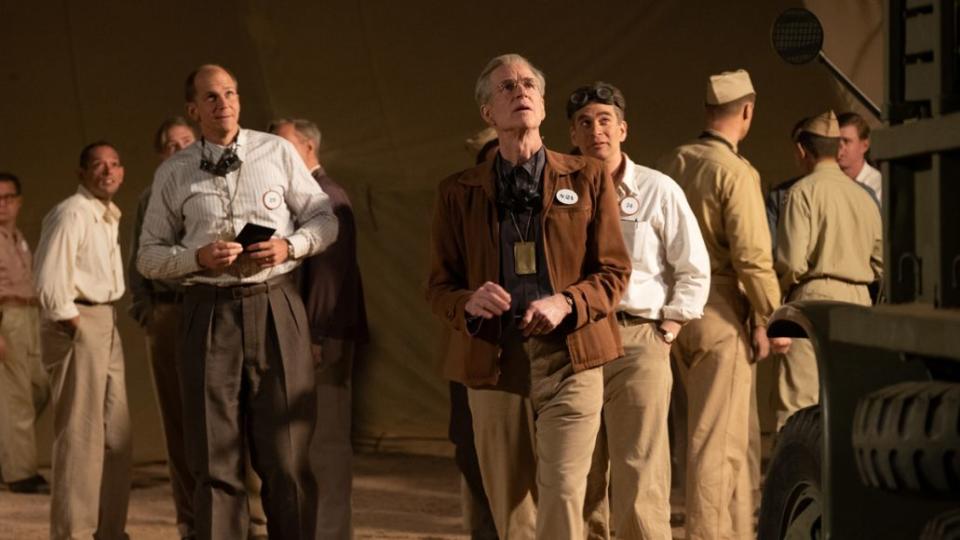Oppenheimer Review: Christopher Nolan Blows Up the Biopic
- Oops!Something went wrong.Please try again later.
- Oops!Something went wrong.Please try again later.
- Oops!Something went wrong.Please try again later.
- Oops!Something went wrong.Please try again later.
The post Oppenheimer Review: Christopher Nolan Blows Up the Biopic appeared first on Consequence.
The Pitch: One of the most significant events of the 20th century — arguably one of the most significant events in human history — was America dropping two nuclear bombs on two cities in Japan, which decisively ended World War II. While many men and women helped to create said bombs, it’s Robert Oppenheimer (Cillian Murphy) who history declared to be “the father of the atomic bomb.” And thus it’s his story which writer/director Christopher Nolan has chosen to tell, with the support of a $100 million budget and what feels like every white male actor working today.
Not Really a Biopic: As a viewing experience, Oppenheimer is a whole lot of movie, a man’s life given the epic treatment — because he did do truly epic things, things that elevate his life story beyond the limitations of genre. And thus, the film proves exceptional at drawing the audience into the experience, when it lets the power of its images do the talking. Its best moments stand out as some of the most original and exciting filmmaking of the year, highs that do a lot to counterbalance the sequences which dive back into bureaucracy and comparatively petty rivalries.
While the name of the main dude is also the title of the film, and the dude in question is a real person, Oppenheimer works hard to escape the traps of the biographical drama, largely successfully. The opening minutes do include a point that can best be described as “J. Robert Oppenheimer has to think about his entire life before he testifies.” However, when the film digs into the particulars of creating not just the atom bomb, but the entire infrastructure required to create said bomb, it’s packed with gripping details.
And when the countdown begins for the one true explosion we see on screen, it’s a simply masterful piece of filmmaking, drawing the audience into a real-time appreciation of what exactly it meant for those men and women to witness this level of history. Thanks to cinematographer Hoyte van Hoytema, it’s like watching the birth of a sun on planet Earth, an awe-inspiring sight, and the second it seems like it’s over, it’s followed by what sounds like the roar of creation, the beginning of the universe — except, of course, it’s creation’s opposite.
Hundreds of filmmakers have depicted explosions before. Hell, before the movies had even figured out how sound worked, people were blowing stuff up on camera. What Nolan achieves here is on a whole other level, technical brilliance in the moment, but all the more powerful because the build up to that moment is so deliberate, the momentum growing and growing with a pace that becomes haunting… it’s why epics of this length need to be this long, so that the payoff is that much sweeter.
And then, it’s time for another hour of conference rooms!

Oppenheimer (Universal)
The Real Enemy: For a movie about a literal world war (followed by a cold war), it takes a while for the true villain of Oppenheimer to emerge. Alongside the development of the most powerful weapon known to mankind, Nolan intercuts sequences featuring Oppenheimer several years after the end of the war, as he appeals the revoking of his security clearance. 1954, lest we forget, was a bad time to have been associated with members of the Communist Party at any point over the course of your life, and Oppenheimer’s life story is filled with such associations.
This isn’t the only running sequence in the film where men sit at tables and talk to each other, either. Oppenheimer’s appeal serves as one of two framing devices, with his hearing in a tiny cramped conference room contrasted with the Senate confirmation proceedings for Lewis Strauss (Robert Downey Jr.). Strauss (in the film and in real life) was the head of the United States Atomic Energy Commission after the war, and it’s through the testimony given that much of the story unfolds.
The film doesn’t hold to any sort of rigid structure, though. Instead, Nolan dances around his timeline like he’s Tom Hanks playing a giant piano at FAO Schwartz (leaving this critic, at least, intrigued by the idea of a chronologically cut version of the film, just to see what it’d be like). And there’s a wild flux of approaches occurring here all at once: black-and-white footage to differentiate Strauss’s perspective on events from Oppenheimer’s all-color perspective, Terrence Malick-esque insert shots to invoke mood and theme, and even the occasional foray into fantasy sequences.
This includes one fantasy sequence, from the perspective of Emily Blunt as Oppenheimer’s alcoholic and temperamental wife, that doesn’t make much sense. Blunt’s performance is a bit one-note throughout the film, largely because the script only gives her one or two notes to play — however, it’s not the performance that’s the issue with this brief glimpse of her POV. The problem is, it comes out of nowhere, because it’s never been her movie. Because…
Men Men Men Men Manly Men Men Men: Look, here is a list of actors who are in Oppenheimer…
Matt Damon, Robert Downey Jr., Josh Hartnett, Casey Affleck, Rami Malek, Kenneth Branagh, Benny Safdie, Dylan Arnold, Gustaf Skarsgård (yes, the brother of the others!), David Krumholtz, Matthew Modine, David Dastmalchian, Jack Quaid, Josh Peck, Dane DeHaan, Alden Ehrenreich, Jason Clarke, James D’Arcy, Tony Goldwyn, Alex Wolff, Scott Grimes, Matthias Schweighöfer, Christopher Denham, Gary Oldman, Harry Groener, James Remar, Tim DeKay, James Urbaniak
That is such a long list — and that’s not even the full list, some cuts were made! There are so many men in this movie, few of whom have much of a moment beyond a few lines of dialogue, maybe a speech to Congress if they’re lucky. At a certain point, it becomes less of a game, trying to quickly connect the familiar face with a name before they vanish, and more of an experience, where you let the vast ocean of famous movie stars and one-time series regulars alike wash over you.

Oppenheimer (Universal)
There are standouts, however. David Krumholtz has been a working character actor since childhood, and confirms here that he’ll be one of our great working character actors until the day he dies, should he want it. Benny Safdie plays the Hungarian physicist Edward Teller with impressive accent work as well as impressive humanity. Robert Downey Jr., freed of Tony Stark’s quipiness, exits his comfort zone to deliver his most nuanced performance in years — and Alden Ehrenreich, Downey’s most frequent scene partner, proves to be the more experienced actor’s equal.
Cillian Murphy, meanwhile, has been a Nolan favorite since 2005’s Batman Begins, with a rich career of both leading man roles as well as stranger character fare. The role of Oppenheimer proves to be a perfect showcase for his talents because of that; Nolan’s script puts the man’s less-than-saintly qualities front and center, giving Murphy plenty of ambiguity to play, without ever losing sight of the qualities that did make Oppenheimer a legend in his own time.
The Verdict: There is so much that Oppenheimer captures with elegant precision and meticulous detail — about the Manhattan Project, about life in Los Alamos during those intense heady years of research and development. While the TV show Manhattan remains a must-see for anyone interested in a deep dive into that time, Nolan still depicts a lot of what was so fascinating about that little desert town filled with secrets.
Meanwhile, Nolan makes the decisive choice to not depict the bombings of Hiroshima and Nagasaki in the film, which limits the audience’s perception of the aftermath to hearsay, with only brief glimpses at the horror funneled entirely through Robert Oppenheimer’s imagination. And from that perspective, the choice makes sense, considering how the real-life Oppenheimer would have had such limited understanding, of the full extent of the destruction he caused.
Oppenheimer is a three-hour movie that really feels like three hours, but when it manages to escape the conference rooms and Congressional hearings, it really cooks. And not just during the jaw-dropping technical achievement of its biggest moments, either. This film is at its best when it confronts head-on the great and terrible moral quandary Oppenheimer himself faced, and talked about openly in the years after World War II — the wildly conflicting feelings that come with ending a terrible war with a terrible cost.
We’ll never know what would have happened had the atom bomb never been invented, if Oppenheimer and his team had failed. Thanks to Nolan, though, we now have a film that captures why it was so important that they didn’t, without losing sight of the human toll, or making its a protagonist any more of a hero than he deserves.
Where to Watch: Oppenheimer blasts into theaters on Friday, July 21st.
Trailer:
Oppenheimer Review: Christopher Nolan Blows Up the Biopic
Liz Shannon Miller
Popular Posts

